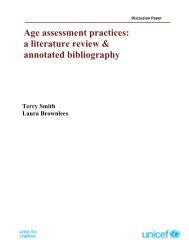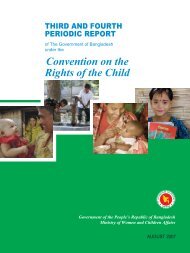Government-funded programmes and services for vulnerable - Unicef
Government-funded programmes and services for vulnerable - Unicef
Government-funded programmes and services for vulnerable - Unicef
Create successful ePaper yourself
Turn your PDF publications into a flip-book with our unique Google optimized e-Paper software.
Department of Basic Education<br />
■<br />
■<br />
■<br />
ensure that all refugee children are guaranteed the rights guaranteed to other<br />
children, which would include the right to education; 76<br />
ensure that children who become pregnant be<strong>for</strong>e completing their education<br />
are given an opportunity to continue with their education on the basis of their<br />
individual ability; 77<br />
protect children from child labour (including economic exploitation <strong>and</strong><br />
domestic work) that is harmful to the child’s education or development. 78<br />
The DoBE has recognised that <strong>vulnerable</strong> children, including those made <strong>vulnerable</strong><br />
by poverty, HIV/AIDS <strong>and</strong>/or a disability, have historically faced numerous barriers<br />
to education. These barriers have included cost barriers related to school fees, school<br />
uni<strong>for</strong>ms <strong>and</strong> transport, discrimination <strong>and</strong> inadequate facilities appropriate to meet the<br />
specific needs linked to the vulnerability in question. The poor quality of education has<br />
also proven to be a barrier, especially <strong>for</strong> children made <strong>vulnerable</strong> by poverty <strong>and</strong> <strong>for</strong><br />
children with disabilities. The Department has sought to address these barriers through<br />
the following policies <strong>and</strong> laws so as to realise its vision of ‘a South Africa in which all<br />
our people will have access to lifelong learning, education <strong>and</strong> training opportunities<br />
which will, in turn, contribute towards improving the quality of life <strong>and</strong> building a<br />
peaceful, prosperous <strong>and</strong> democratic South Africa’ (DoE 2009a: 18).<br />
Key policies 79<br />
● Education <strong>and</strong> Training White Paper, 1995<br />
● Language in Education Policy, 1996<br />
● National Policy on HIV/AIDS <strong>for</strong> Learners, Educators in Public Schools, <strong>and</strong> Students<br />
in Further Education <strong>and</strong> Training Institutions, 1999<br />
● Education White Paper 6: Special Needs Education – Building an Inclusive Education<br />
<strong>and</strong> Training System, 2001<br />
● Education White Paper 5 on Early Childhood Education, 2001<br />
● School Health Policy, 2003<br />
● Policy Framework on Orphans <strong>and</strong> other Children Made Vulnerable by HIV <strong>and</strong><br />
AIDS South Africa, 2005<br />
● National Guidelines on School Uni<strong>for</strong>ms, 2006<br />
● The National Action Plan <strong>for</strong> Orphans <strong>and</strong> Other Children Made Vulnerable by HIV<br />
<strong>and</strong> AIDS South Africa, 2006–2008<br />
● National Norms <strong>and</strong> St<strong>and</strong>ards <strong>for</strong> Grade R Funding, 2008<br />
● Strategic Plan 2009–2013 <strong>and</strong> Operational Plans <strong>for</strong> 2009–2010, Department of<br />
Education<br />
● National School Nutrition Programme – A Guide <strong>for</strong> Secondary Schools, 2009<br />
● The revised National Action Plan <strong>for</strong> Orphans <strong>and</strong> Other Children Made Vulnerable<br />
by HIV <strong>and</strong> AIDS South Africa, 2009–2012<br />
● The Child Labour Programme of Action <strong>for</strong> South Africa: Phase 2: 2008–2012,<br />
Department of Labour<br />
● HIV & AIDS <strong>and</strong> STI National Strategic Plan, 2007–2011<br />
● Measures <strong>for</strong> the Prevention <strong>and</strong> Management of Learner Pregnancy, 2007,<br />
Department of Education<br />
76 UNCRC, Article 22; ACRWC, Article 23<br />
77 ACRWC, Article 11(6); African Youth Charter, Article 13(4)(h)<br />
78 UNCRC, Article 32(1); ACRWC, Article 15(1)<br />
79 This study drew on previous policy mapping exercises conducted by Kallmann (2008) <strong>and</strong> Giese <strong>and</strong> Koch (2008a)<br />
to assist with the identification <strong>and</strong> navigation of a number of the key policies <strong>and</strong> laws.<br />
137
















